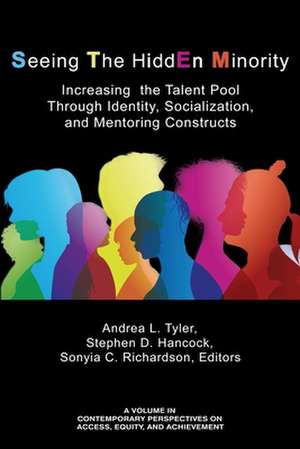Seeing The HiddEn Minority: Contemporary Perspectives on Access, Equity and Ac
Editat de Stephen D. Hancock, Sonyia C. Richardson, Andrea L. Tyleren Limba Engleză Paperback – 3 iun 2020
| Toate formatele și edițiile | Preț | Express |
|---|---|---|
| Paperback (1) | 385.14 lei 6-8 săpt. | |
| Information Age Publishing – 3 iun 2020 | 385.14 lei 6-8 săpt. | |
| Hardback (1) | 582.53 lei 6-8 săpt. | |
| Information Age Publishing – 3 iun 2020 | 582.53 lei 6-8 săpt. |
Preț: 385.14 lei
Nou
Puncte Express: 578
Preț estimativ în valută:
73.70€ • 76.79$ • 61.02£
73.70€ • 76.79$ • 61.02£
Carte tipărită la comandă
Livrare economică 03-17 aprilie
Preluare comenzi: 021 569.72.76
Specificații
ISBN-13: 9781641139489
ISBN-10: 164113948X
Pagini: 170
Dimensiuni: 156 x 234 x 9 mm
Greutate: 0.25 kg
Editura: Information Age Publishing
Colecția Contemporary Perspectives on Access, Equity and Ac
Seria Contemporary Perspectives on Access, Equity and Ac
ISBN-10: 164113948X
Pagini: 170
Dimensiuni: 156 x 234 x 9 mm
Greutate: 0.25 kg
Editura: Information Age Publishing
Colecția Contemporary Perspectives on Access, Equity and Ac
Seria Contemporary Perspectives on Access, Equity and Ac






